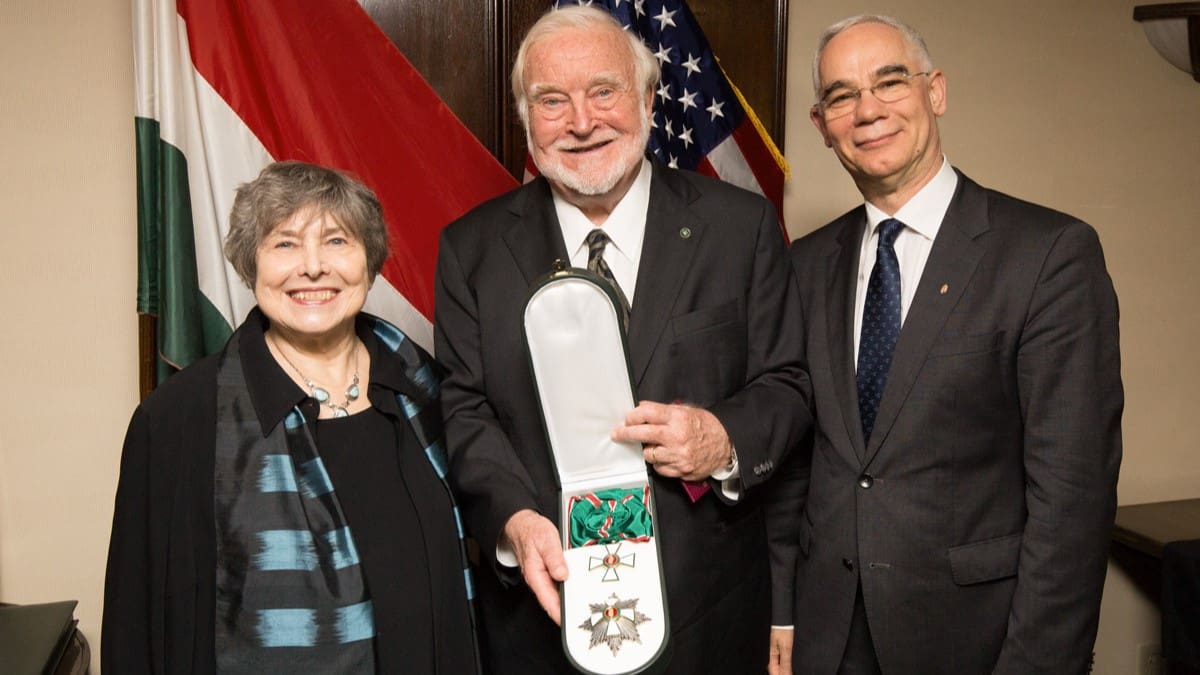Mihály Csíkszentmihályi was born in 1934, Fiume (Rijeka, Croatia), a formerly Hungarian city on the Adriatic coast that at that time was in Italy’s possession. Csíkszentmihályi’s parents were Edith Jankovich de Jeszenicze and a Hungarian diplomat, Alfréd Csíkszentmihályi (originally Hausenblasz). The family suffered a great loss during WWII: the battlefield claimed the lives of two of Mihály’s older brothers. As catastrophic as that experience was at a young age, this trauma inspired Csíkszentmihályi to search for the truth and the key to a life full of meaning. Else than experiencing loss, one of the events that influenced him greatly was when he attended, by chance, a lecture by Carl Jung himself—the lecture deepened his resolve to dedicating his life to the study of the human psyche. Once he emigrated to the United States, he carried his deep passion for psychology with him.
He studied psychology and soon embarked on an academic career that ended up changing American as well as world psychology forever. In 1959, when he graduated from the University of Chicago, Mihály Csíkszentmihályi began teaching at Lake Forest College. Later on, he became a professor at his alma mater, whereas also acquiring a position on the advisory board of the prestigious Encyclopaedia Britannica. From 1999 until his death, he held the title of the professor of psychology and management at Claremont Graduate University. In addition, honouring his outstanding scientific publications in the American Psychologist, the leading journal of the American Psychological Association, he was appointed a Fellow of the American Academy of Arts and Sciences.
As a top US academic, who had been awarded the most distinguished American academic honours, after the dissolution of the Socialist bloc, he started to strengthen his connections with the academia of Hungary. He obtained membership in the Hungarian Academy of Sciences, received the Széchenyi Prize as ‘the father of Flow’ (i.e., flow theory) and was awarded with the Grand Cross of The Order of Merit, the fourth highest state recognition in Hungary.
Flow as a State of Mind
His scientific achievement of the utmost importance, the one that has garnered the most notable acclaim, is his psychological ‘flow’ theory, a concept that attempts to grasp the essence of what it means to be happy. In its basics, the theory proposes that the state of the most balanced and optimal experience is the one that gives the feeling of harmonic unity with what a person is doing. He described the essence of the concept as ‘being completely involved in an activity for its own sake. The ego falls away. Time flies. Every action, movement, and thought follows inevitably from the previous one, like playing jazz. Your whole being is involved, and you’re using your skills to the utmost.’
To achieve this state, the challenge that a person is engaging in needs to match their knowledge and skills—for someone to achieve that state, the task ought not to be too easy or too hard. If it is, this will result in feeling boredom or even apathy. Csíkszentmihályi listed several requirements for achieving the state of flow, including ‘challenge-skill balance, merging of action and awareness, clarity of goals, immediate and unambiguous feedback, concentration on the task at hand, paradox of control, transformation of time, loss of self-consciousness, and autotelic experience.’ His book titled Flow: The Psychology of Optimal Experience, published in 1990, became a bestseller in the 90s, earning Csíkszentmihályi the title of ‘the founder of positive psychology’.
Mihály Csíkszentmihályi left a long-enduring legacy that has a strong and tangible international impact even today. He, along with his colleague, Jeanne Nakamura, was a founding father of a foundation, Quality of Life Research Center, and other mental health institutions all across the United States. His books, such as The Evolving Self (1993), Creativity (1996), and Good Business (2003) have been translated into more than 20 languages and became the recognized masterpieces of business and psychological literature. Last but not the least, his famous TED talks lecture on the ‘secret of happiness’ has been watched by millions of people:
Mihaly Csikszentmihalyi: Flow, the secret to happiness
http://www.ted.com Mihaly Czikszentmihalyi asks, “What makes a life worth living?” Noting that money cannot make us happy, he looks to those who find pleasure and lasting satisfaction in activities that bring about a state of “flow.” Follow us on Twitter http://www.twitter.com/tednews Checkout our Facebook page for TED exclusives https://www.facebook.com/TED
He left a rich scientific legacy, with a precious and profound insight into the nature of a happy life:
‘Happiness is not something that just happens to us, nor is it related to luck or chance. It cannot be bought with money, it cannot be acquired with power. It does not depend on external events, but rather on how we interpret them ourselves. Happiness is actually a state that you have to prepare for, and everyone has to nurture and protect themselves.’
Mihály Csíkszentmihályi died at the age of 88 on 20 October 2021, in his Clermont home, surrounded by his loving family.







